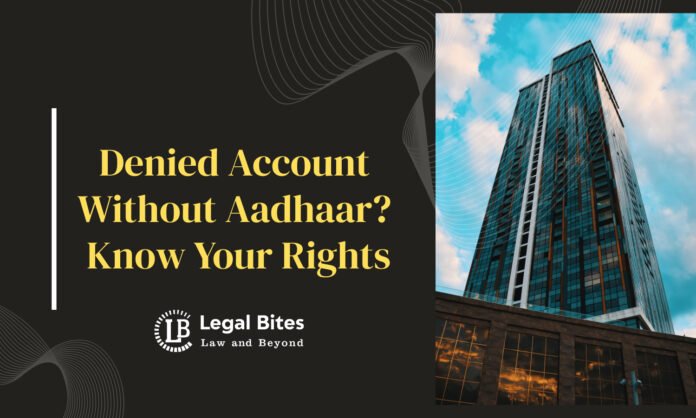In a country where financial inclusion is a cornerstone of economic development, the denial of basic banking services raises serious legal and constitutional concerns. Aadhar, India’s unique biometric identity system, was introduced as a means of simplifying access to various welfare schemes and services. However, its usage as a mandatory identification document in all spheres of life has been a subject of judicial scrutiny.
One recurring issue has been whether banks can refuse to open an account merely because a person does not possess an Aadhaar card. The recent 2025 judgment of the Bombay High Court in Microfibers Pvt Ltd v. Yes Bank Ltd (2025) throws light on this crucial legal question.
Legal Background: Aadhaar and Its Role
The Aadhaar scheme, governed by the Aadhaar (Targeted Delivery of Financial and Other Subsidies, Benefits and Services) Act, 2016, was intended for the targeted delivery of subsidies and benefits. However, in practice, it became widely used for opening bank accounts, filing taxes, and accessing other essential services.
- The use of Aadhaar was challenged on constitutional grounds in the landmark case of Justice K.S. Puttaswamy (Retd.) & Anr. v. Union of India & Ors., W.P. (C) No. 494 of 2012.
- On 26th September 2018, the Supreme Court held that mandating Aadhaar for opening bank accounts violated the right to privacy and was unconstitutional.
- However, it permitted Aadhaar to be used voluntarily as proof of identity.
Case Study: Microfibers Pvt Ltd v. Yes Bank Ltd (2025)
Factual Matrix
- The petitioner, Microfibers Pvt Ltd, approached Yes Bank in January 2018 to open a bank account but was denied on the ground that it had not provided an Aadhaar card.
- Despite interim Supreme Court orders and final judgment in Puttaswamy, the bank delayed opening the account until January 2019.
- The company faced a loss of income as it was unable to rent out its property in Mumbai during this period.
Bank’s Position
- The bank initially claimed Aadhaar was mandatory.
- After the Supreme Court’s judgment, the bank agreed in November 2018 to open the account without Aadhaar but delayed implementation.
High Court’s Verdict
The Bombay High Court, comprising Justices M.S. Sonak and Jitendra Jain, held that:
- The bank had no justification for delaying the account opening post the Supreme Court’s 2018 ruling.
- The petitioner was entitled to compensation for the inconvenience and loss of opportunity.
- The Court ordered ₹50,000 compensation to the petitioner, rejecting the ₹10 lakh demand as exaggerated.
Key Highlights of the Judgment
Justice M.S. Sonak and Justice Jitendra Jain observed:
” The Hon’ble Supreme Court struck down the requirement of providing an Aadhar Card for opening a Bank account. Therefore, from 26th September 2018 onwards, there was no impediment to the Respondent-Bank opening the Bank account without insisting on the Aadhaar Card.
Therefore, upon taking into consideration of the above circumstances cumulatively, we direct the Respondent-Bank to pay the Petitioner compensation of Rs. 50,000/- within a period of eight weeks from the date on which the Petitioner provides a copy of this order to the Respondent-Bank.”
Current Legal Position on Aadhaar and Bank Accounts
Following the Puttaswamy ruling and the 2025 Microfibers judgment:
Aadhaar is not mandatory for:
- Opening savings/current accounts.
- Small account operations (under RBI regulations).
- KYC verification (as long as other OVDs—Officially Valid Documents—are provided).
Acceptable KYC documents include:
- Passport
- Voter ID
- Driving Licence
- PAN card
- NREGA Job Card
Aadhaar cannot be insisted upon except:
- When availing direct benefit transfers (DBT) or subsidy-linked services.
Even in such cases, banks must accept Aadhaar Enrollment ID or any valid OVD initially.
Regulatory Position: RBI’s KYC Norms
The Reserve Bank of India, post-Puttaswamy, issued updated KYC Master Directions in 2019 and subsequent circulars confirming that:
- Aadhaar can be used voluntarily as an identity document.
- Banks cannot mandate Aadhaar for non-subsidy-based banking services.
- Coercion to submit Aadhaar may amount to regulatory non-compliance.
These directions bind all Scheduled Commercial Banks, Co-operative Banks, and NBFCs.
Implications of the Bombay High Court Judgment
The Microfibers judgment is significant for several reasons:
- Affirms Citizens’ Rights: It reaffirms that banking access is a basic right, and denial based on Aadhaar violates individual liberties.
- Banking Sector Accountability: Banks must ensure staff are updated on KYC norms and the Supreme Court directions.
- Judicial Recognition of Practical Harassment: The judgment acknowledges real-world difficulties faced due to bureaucratic non-compliance, especially for senior citizens, startups, and those with no Aadhaar.
- A Precedent for Compensation: Even though the amount awarded was modest, the case sets a precedent for financial relief when institutions act in defiance of Supreme Court orders.
Remedies Available to Citizens
If a bank refuses account opening citing Aadhaar non-submission, individuals can:
- File a Complaint with the Bank’s Grievance Redressal Officer.
- Escalate to the RBI’s Banking Ombudsman.
- File a Writ Petition under Article 226 of the Constitution if constitutional rights are violated.
- Citizens must also demand a written refusal, which can be useful in legal proceedings.
Conclusion
It is illegal for banks to refuse to open a bank account solely on the ground that the applicant does not possess an Aadhaar card. The practice violates constitutional principles of privacy, dignity, and equality. The Bombay High Court’s 2025 ruling reinforces the fact that banks must follow the law laid down by the Supreme Court and regulatory directives issued by the RBI.
The judiciary has once again acted as a guardian of individual rights, ensuring that financial institutions do not overstep their authority. It is now up to banks to revise their internal practices, educate their staff, and ensure that financial inclusion is not made contingent upon a single identity document.

